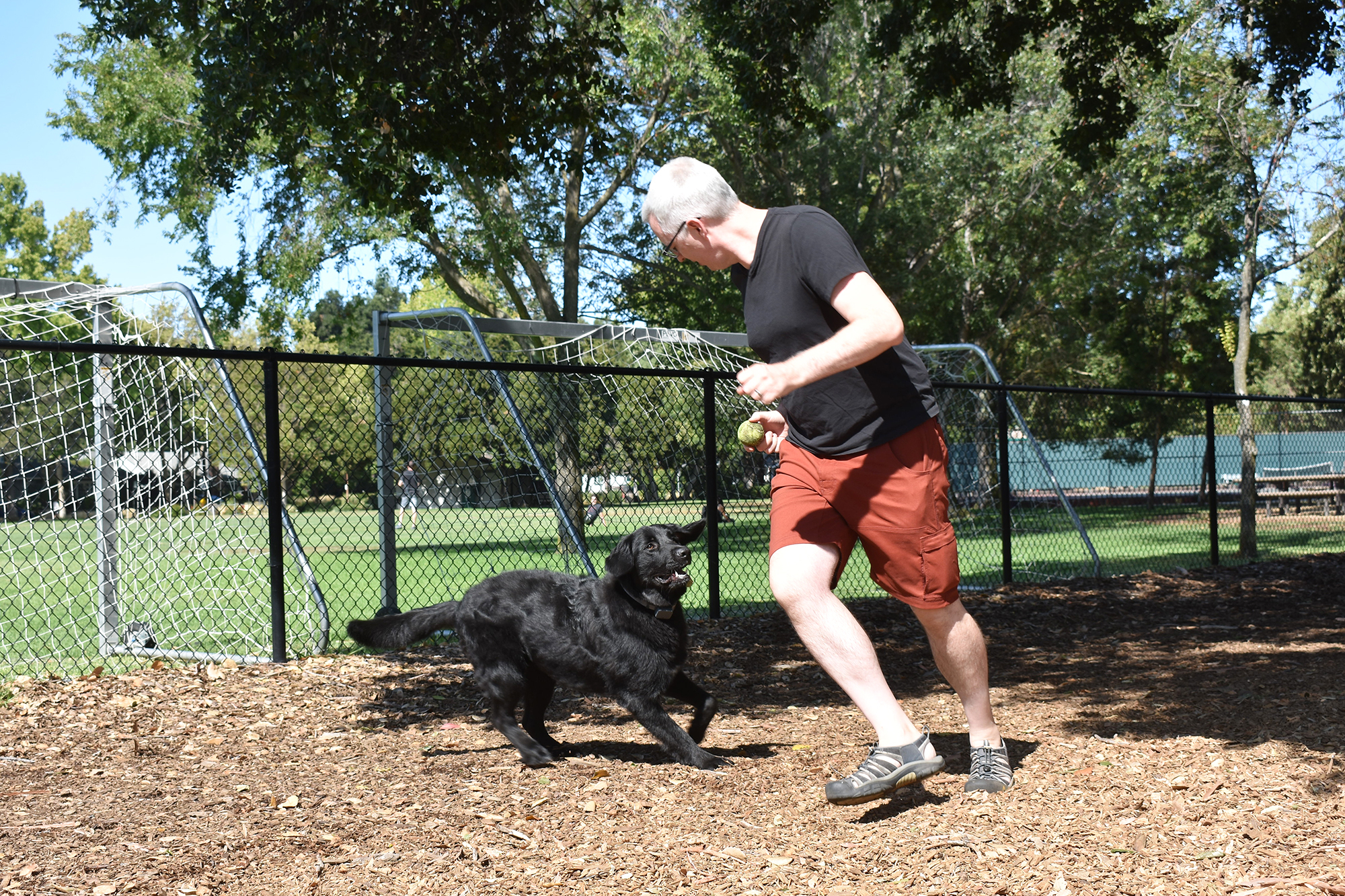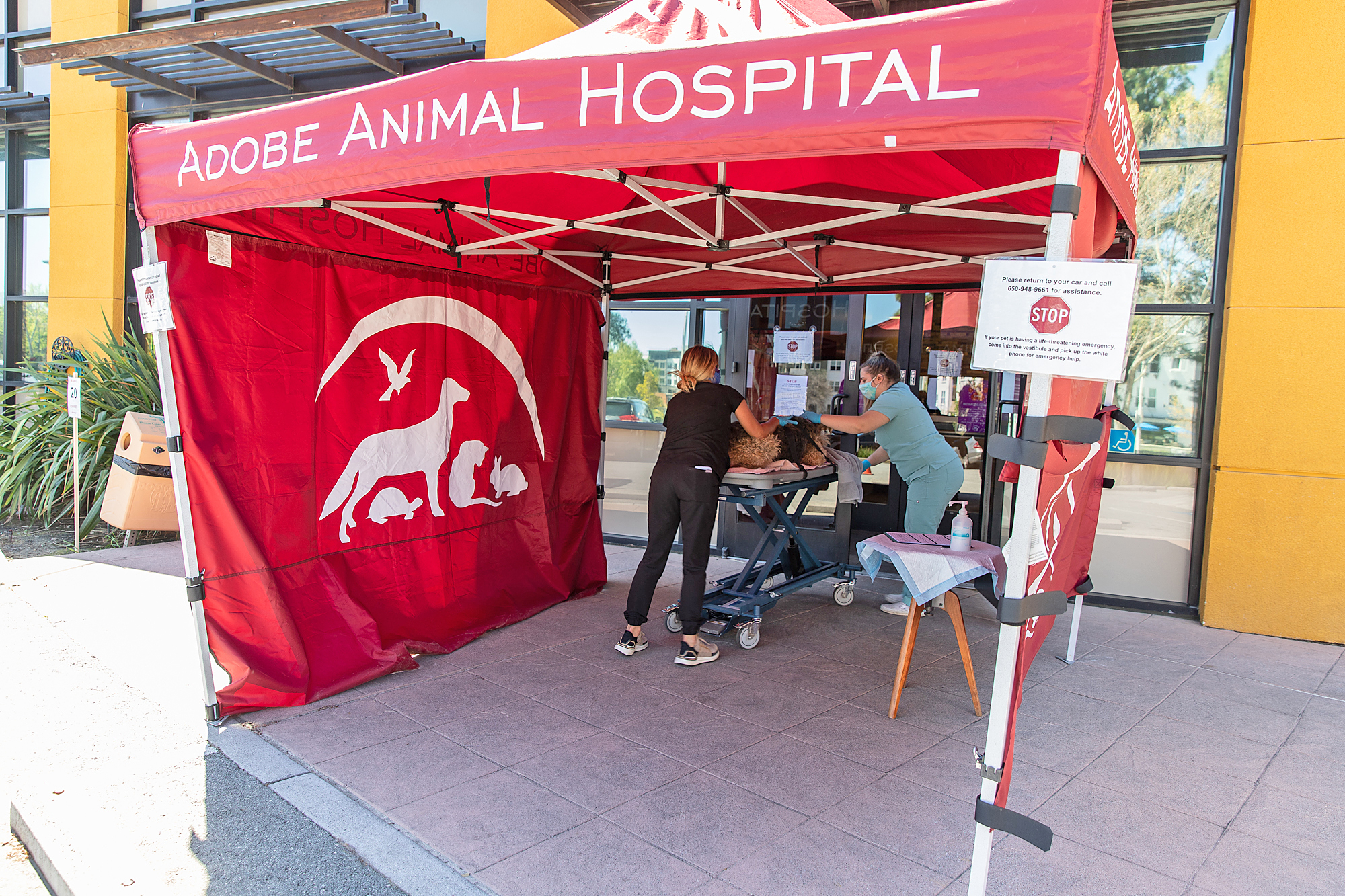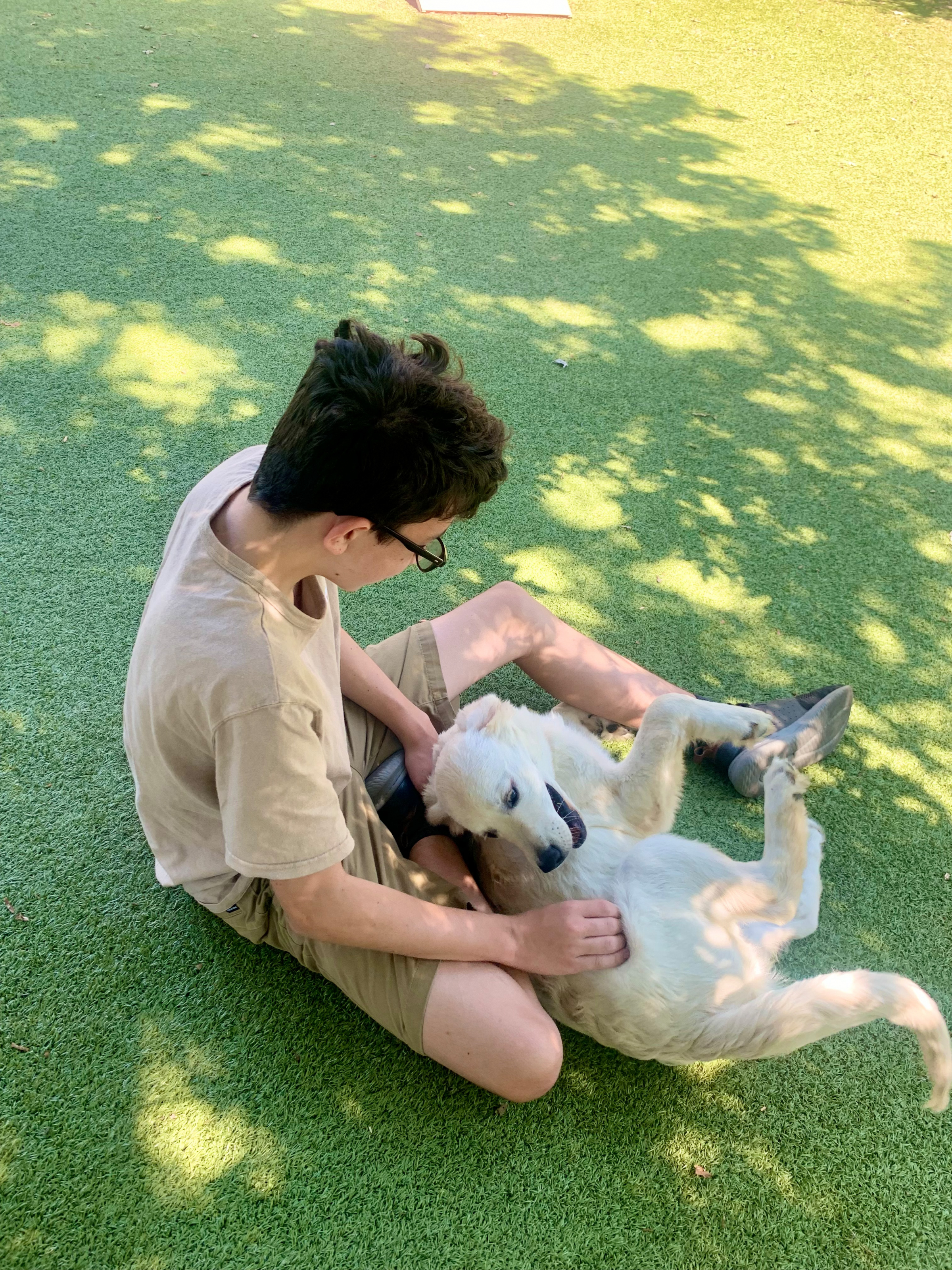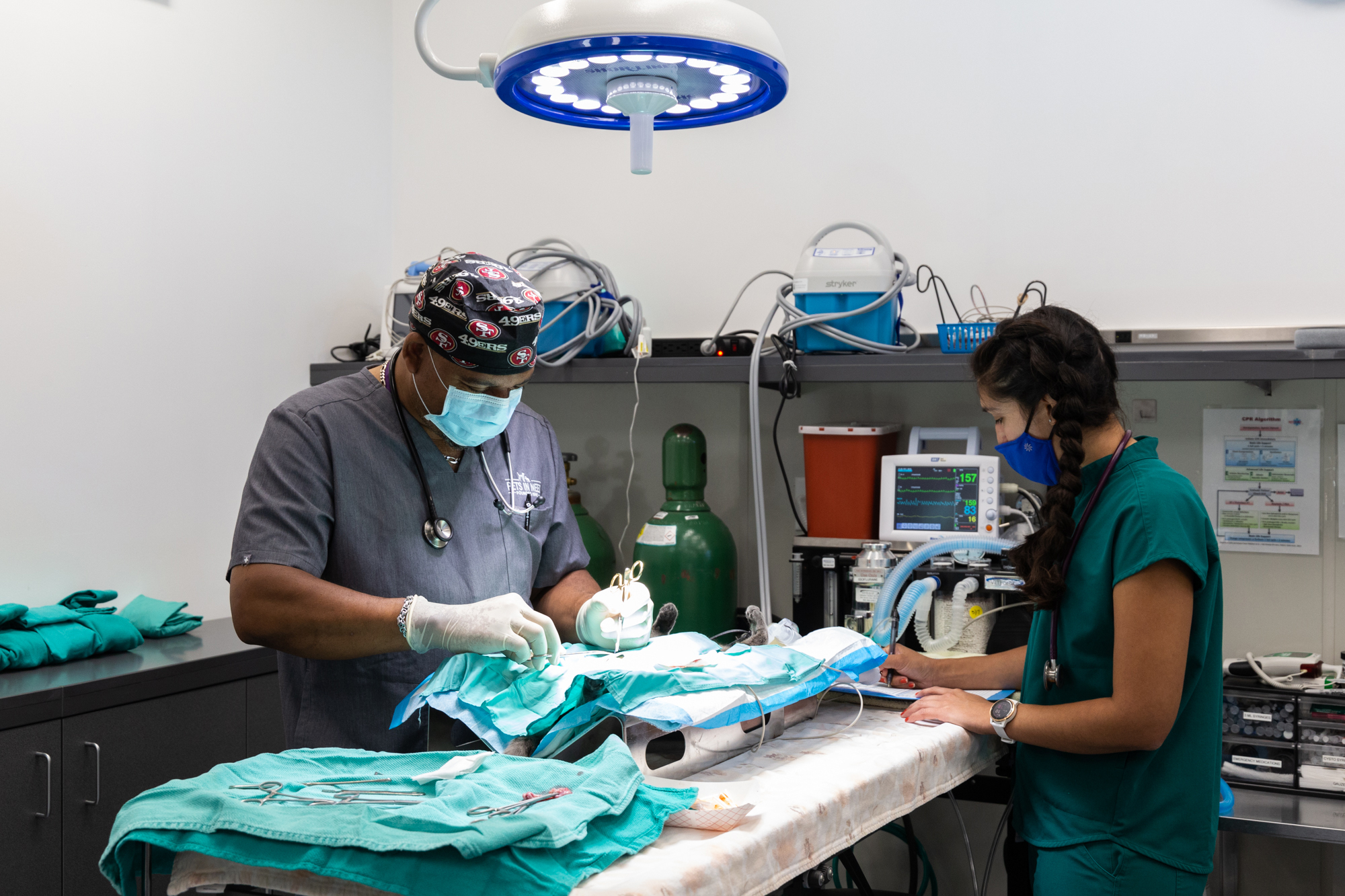Chris Colohan and his family searched far and wide for a new dog this spring, finding few options amid a pandemic-induced spike in pet adoptions. They ultimately adopted Vanta in May, a sweet 2-year-old golden retriever mix, from a rescue group north of Sacramento, but soon discovered that finding him wasn't going to be their only challenge.
Once they brought Vanta to their Palo Alto home, Colohan called Adobe Animal Hospital in Los Altos to schedule a checkup for their new pup. It turned out the veterinary clinic wasn't taking new clients because it had seen such a surge in requests for appointments during the pandemic. The second vet he called didn't have any openings for two months.
"It was a bit of a surprise," said Colohan, who ultimately found an appointment after getting a recommendation from a friend.
Up and down the Peninsula, pet owners are having trouble finding medical care for their animals, often being turned away or facing long wait times when they try to find an appointment at one of the area's dozens of veterinary clinics. The troubles stem, veterinarians say, from the spike in pet adoptions during the pandemic, coupled with nationwide staffing shortages. Health precautions also have contributed to the delays as many veterinarians switched to curbside appointments last year, which took more time.
The phones have been ringing nearly nonstop at Whipple Avenue Pet Hospital in Redwood City, as pet owners scour the area for any available appointments, said veterinarian Alvin Hong.
"During the pandemic ... we've been getting so many new puppies and new patients — it's crazy," Hong said.
Appointments at Whipple are currently booked out for about a month, with limited first-come, first-served urgent care spots offered for more immediate needs, Hong said.
Facing a similar influx of patients, Adobe Animal Hospital decided back in May to stop taking any new clients and limit walk-ins to emergencies only. The restrictions were an attempt to ensure existing clients could get appointments more quickly, although wait times are still generally a week or more, said Cindy Biby, Adobe's hospital experience manager, whose job includes fielding concerns from the public.
"We don't love all the changes that we've had to make," Biby said. "Unfortunately they're necessary to survive right now and to continue providing veterinary care."
Staffing shortages
Palo Alto resident Karen Ewart is among the pet owners who have voiced their objections to Biby. A longtime Adobe client, Ewart became frustrated after having trouble scheduling an appointment for her dog, Chloe, whom she believed was suffering from whooping cough.
"I've come to rely on Adobe," Ewart said. "You come to count on certain things."
After running into difficulty at Adobe, Ewart tried calling roughly 20 other veterinarians but kept running into similar problems. Ultimately, she ended up on the phone with Biby, who told her veterinarians are facing a staffing crunch at the same time demand for their services has been spiking.
A number of Adobe employees moved out of the area during the pandemic, while others reduced their hours, Biby said in an interview. Within a four-month span, eight doctors left.
The turnover has been particularly difficult because there was already a widespread shortage of veterinarians and support staff before the pandemic.
"The staffing challenges are profession-wide, nationwide. It's everywhere," said Stephanie La Plume, the head of the emergency department at MedVet Mountain View.
MedVet has been continuously trying to hire during the pandemic. A sometimes unseen part of the staffing challenge, LaPlume said, is that the veterinary profession is mostly made up of women, who left the workforce in large numbers during the pandemic as they disproportionately shouldered child care responsibilities. Burnout has also been an issue as veterinarians try to keep up with the influx of new patients.
"We've been working long hours for a long time trying to help all these pets," La Plume said.
Pandemic surge in pet adoptions
Pet adoptions increased dramatically during the pandemic. When Pets In Need, the animal services provider for Palo Altos, Los Altos and Los Altos Hills, had to close its shelters last March, staff were able to find foster homes for all of the roughly 150 animals within two days, executive director Al Mollica said.
Over the course of the pandemic, Mollica said an "amazing" number of adoptions have managed to occur, despite health precautions leading to a cumbersome adoption process.
"That was pretty extraordinary, that people fought their way through the bureaucracy to adopt these animals," Mollica said.
Nearly 1 in 5 households nationwide got a dog or cat during the pandemic, according to a May survey by the ASPCA.
Chris Hurtt's family was among that group. The Palo Alto residents brought home Baker, a golden retriever puppy, in May. When Hurtt went to schedule Baker an appointment at the vet clinic their other dog goes to, the earliest opening was two weeks away and required seeing a different doctor.
This wasn't the first time during the pandemic Hurtt ran into problems getting veterinary care. Last summer, the family needed to travel at the last minute to visit relatives. Before their dog could be boarded at a kennel, he needed to catch up on a vaccination. Hurtt had to call at least five different vets to find someone able to administer the shot within the next couple days.
"I've never run into anything like this, ever," said Hurtt, who has owned dogs for more than a decade.
Delays aren't just an issue for preventive care like vaccinations. Emergency visits are also taking longer. The emergency room at MedVet, which focuses on emergency and specialty care, is "busier than ever before," La Plume said.
"We've seen so many more patients and have longer wait times," she said. "It's unprecedented."
Before the pandemic, wait times in the emergency room were rarely longer than three hours, according to La Plume. Now, four to six hours is relatively common for pets in stable condition. At times, it's stretched to eight hours. In certain cases, MedVet has paused accepting any more pets to the emergency room, except those in critical condition.
"People are frustrated," La Plume said. "They're used to coming to the ER and being seen pretty quickly, and now it takes a very long time for anything stable."
Part of the reason for the increase is because delays at general practice vets cause people to come to the emergency room instead, she said.
In some cases, the pandemic disruptions have led to tragic consequences. Last summer and fall, MedVet saw double to triple the typical number of dogs coming in with canine parvovirus, La Plume said. Parvovirus is often fatal if left untreated, but it's preventable through vaccination.
With so many people getting pandemic puppies but not managing to schedule vaccine appointments, she said, more dogs were contracting the highly contagious virus.
"They're some of the worst cases we see in the hospital," she said. "It breaks all our hearts to see puppies so sick and some of them die even despite their best efforts."
Pets in Need works to make sure animals get vaccinated by holding free or low-cost vaccine clinics. During the pandemic, demand has spiked "pretty significantly" for these events, Mollica said. A recent clinic had such high turnout that staff had to turn people away.
Part of the demand comes from people struggling financially during the pandemic, who turn to the nonprofit shelter to provide affordable care. Pets in Need has also seen high interest in the free and low-cost surgeries it offers.
Ultimately, local veterinarians agreed the path out of the current backlog won't be short and will require finding more staff, which has proven difficult.
"It's just going to take time to have more staff in place because there's a lot of new pets out there and they're not going anywhere," La Plume said. "I expect our caseload is going to be high for a long time."






Comments